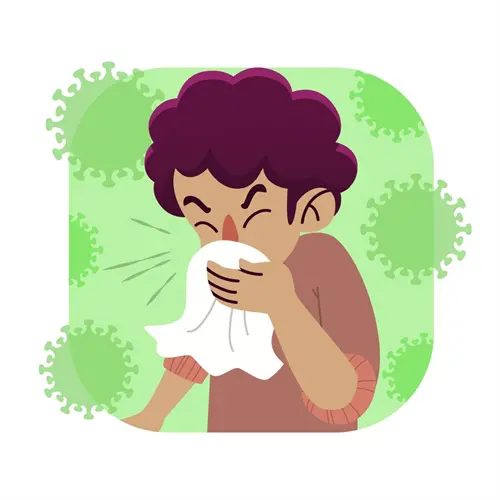Preventive Healthcare
Nasal Congestion: Causes, Remedies, and Effective Treatment Options
153 Views
0

Nasal congestion, commonly known as a stuffy nose, is a frustrating condition that affects millions worldwide. Whether triggered by allergies, infections, or environmental factors, a blocked nose can significantly impact your quality of life. In this article, we'll explore the causes, symptoms, and most effective nasal congestion remedy and treatment options. Armed with this knowledge, you can breathe easy again.
What is nasal congestion (stuffy nose)?
Nasal congestion, or a stuffy nose, happens when the tissues lining the nasal passages become swollen and inflamed, restricting airflow. This is often accompanied by mucus buildup, making breathing through the nose difficult. Common nasal congestion causes include colds, allergies, or sinus infections. While usually not serious, persistent congestion may signal an underlying condition that requires medical attention. Managing symptoms with hydration, steam inhalation, or saline sprays can provide relief, but consult a healthcare provider if congestion persists or worsens.
How does nasal congestion affect your body?
Nasal congestion can affect your body in several ways, extending beyond just a blocked nose. Common nasal congestion causes include colds, allergies, and sinus infections, which can lead to swelling, mucus buildup, and breathing difficulties. This can disrupt sleep, causing fatigue, poor concentration, and reduced productivity.
Nasal congestion may also trigger sinus pressure, headaches, and facial pain. In some cases, untreated congestion can lead to secondary infections like sinusitis or ear infections. Effective nasal congestion treatment options include saline rinses, steam inhalation, decongestants, and antihistamines, depending on the underlying cause.
Managing nasal congestion promptly can improve breathing, enhance sleep quality, and prevent complications. If symptoms persist or worsen, seeking medical advice is recommended to address the root cause and ensure proper treatment.
Who does it affect?
Nasal congestion can affect people of all ages, from infants to the elderly. However, individuals with allergies, asthma, or a weakened immune system may be more prone to it.
What are the symptoms of nasal congestion?
The most common symptoms of nasal congestion include:
- Blocked or stuffy nose
- Runny nose with clear or thick mucus
- Sinus pressure and facial pain
- Headache
- Reduced sense of smell and taste
What triggers nasal congestion?
Nasal congestion can be triggered by several factors that cause inflammation in the nasal passages.
- Common nasal congestion causes include allergens such as pollen, dust mites, and pet dander, which can irritate the nasal lining.
- Viral infections like the common cold or flu and bacterial infections such as sinusitis are also frequent triggers.
- Environmental irritants like smoke, pollution, and strong odours can worsen congestion.
- Additionally, hormonal changes during pregnancy or menstruation may contribute to nasal swelling.
- Certain medications, particularly those containing antihistamines or decongestants, can also play a role.
Identifying your specific triggers is essential for effective prevention and management. By understanding what causes your nasal congestion, you can take steps to reduce exposure and adopt treatments that provide lasting relief.
What are the most common causes of nasal congestion?
Several factors can lead to nasal congestion, causing the lining of your nasal passages to become inflamed and swollen. The most frequent causes include:
- Viral infections: The common cold and flu are the top culprits behind acute nasal congestion.
- Allergies: Allergic reactions to substances like pollen, dust mites, or pet dander often trigger congestion.
- Environmental irritants: Exposure to tobacco smoke, strong perfumes, or pollution can irritate the nasal lining.
- Structural issues: A deviated septum or nasal polyps may block the airways.
Here's a closer look at two major types of nasal inflammation:
Allergic Rhinitis
If your stuffy nose coincides with itchy eyes and sneezing, especially during certain seasons or around specific triggers, you may have allergic rhinitis. This occurs when your immune system overreacts to allergens like pollen, releasing chemicals that cause nasal inflammation. According to the American College of Allergy, Asthma, & Immunology, allergic rhinitis affects up to 60 million Americans each year.
Nonallergic Rhinitis
Nonallergic rhinitis involves nasal congestion without an allergic cause. Various factors can trigger it, such as:
- Viral infections
- Hormonal changes (like during pregnancy)
- Certain medications
- Changes in weather or humidity
- Strong odors or irritants
How to diagnose nasal congestion
If your nasal congestion or stuffy nose persists or frequently recurs, consult your healthcare provider. They will review your medical history and symptoms to identify the underlying cause. Your doctor may recommend certain tests, such as:
- Allergy tests to check for specific allergies
- Nasal endoscopy to examine your nasal passages
- Imaging tests like CT scans if structural issues are suspected
Providing your doctor with detailed information about your symptoms and triggers can help them accurately diagnose your condition and recommend the most suitable nasal congestion treatment plan.
How to treat nasal congestion
Treating nasal congestion effectively depends on its underlying cause. Common treatments include saline nasal sprays, decongestants, and nasal corticosteroid sprays to reduce inflammation and improve airflow. Saline sprays help flush out mucus and irritants, while decongestants provide temporary relief by shrinking swollen nasal tissues.
For congestion linked to allergies, antihistamines can block allergic reactions, and immunotherapy may offer long-term benefits by desensitizing the immune system.
In addition to medications, home remedies like steam inhalation and humidifiers can provide comfort for nasal congestion. Identifying and managing triggers such as allergens, pollution, or dry air is also important. If symptoms persist, consulting a healthcare provider is recommended for tailored treatment options.
Treatments for Nonallergic Rhinitis
For nonallergic rhinitis, saline nasal sprays are an effective remedy to flush out mucus, allergens, and irritants. Decongestants, available in spray or pill form, offer quick relief by reducing nasal tissue swelling; however, they should only be used for a few days to avoid rebound congestion. Nasal corticosteroid sprays, prescribed by doctors, are ideal for long-term relief as they reduce inflammation in the nasal passages. These treatments help address congestion caused by factors like environmental irritants, hormonal changes, or temperature fluctuations.
Treatments for Allergic Rhinitis
For allergic rhinitis, antihistamines effectively block histamine, reducing symptoms like congestion, sneezing, and itching. Nasal corticosteroid sprays are also recommended for their powerful anti-inflammatory effects. Immunotherapy, delivered through allergy shots or tablets, gradually desensitizes the immune system to allergens, offering long-term relief for persistent allergy-related congestion.
Home Remedies for Congestion
While medical treatments play an essential role in managing nasal congestion, several effective home remedies can provide comfort and improve breathing. Incorporating these natural solutions into your routine can enhance recovery and ease discomfort.
Steam Inhalation
Steam inhalation is a popular nasal congestion remedy that helps loosen mucus and soothe irritated nasal passages. Breathing in steam from a hot shower or a bowl of hot water can provide immediate relief. Adding a few drops of eucalyptus oil enhances its effectiveness by opening airways and reducing inflammation.
Hydration
Staying well-hydrated is key to thinning mucus and promoting drainage. Drink plenty of water, herbal teas, or warm broths to keep your nasal passages moist. Aim for at least eight glasses of fluids daily to support your body’s natural healing process.
Nasal Irrigation
Nasal irrigation using a neti pot or saline rinse kit effectively flushes out mucus, allergens, and irritants. This method clears nasal passages and improves airflow. Always use sterile water and clean your irrigation device thoroughly to prevent infection.
Warm Compress
Applying a warm compress over your sinuses can reduce nasal congestion discomfort and improve circulation. The warmth helps loosen mucus and relieves sinus pressure, making it easier to breathe.
Elevate Your Head
Sleeping with your head elevated using an extra pillow or wedge pillow prevents mucus from pooling in your sinuses overnight. This simple adjustment can promote better drainage and reduce morning congestion.
Eating Spicy Foods
Spicy foods can act as a natural nasal congestion remedy by thinning mucus and promoting drainage. Ingredients like chili peppers, horseradish, and wasabi help clear nasal passages and improve airflow.
While these home remedies offer effective nasal congestion relief, they should complement — not replace — medical treatment for chronic or severe symptoms. Finding the right nasal congestion remedy can help you breathe easier and improve your overall well-being.
How do we clear a stuffy nose?
When you're struggling with nasal congestion or a stuffy nose, try these tips to find relief:
- Gently blow your nose to clear out the mucus.
- Use a saline nasal spray to moisturise and flush out your nasal passages.
- Apply a warm compress over your sinuses for several minutes.
- Take a hot shower or inhale steam to loosen mucus.
- Stay hydrated to keep mucus thin and mobile.
- Use a netipot with lukewarm water to flush out irritants.
Combining these techniques with appropriate medical treatments can help you manage nasal congestion effectively.
When to see a doctor?
While nasal congestion can often be treated at home, certain symptoms may require medical attention. Seek help if your congestion lasts more than 10 days, worsens despite treatment, or is accompanied by severe facial pain, headache, or fever above 101°F (38.3°C). Green or yellow nasal discharge may also indicate a bacterial infection. Consulting your healthcare provider ensures you receive proper diagnosis and treatment, especially if symptoms persist or worsen despite home remedies and over-the-counter care.
Conclusion
Nasal congestion can be frustrating, but understanding its causes and treatment options can help you find relief. If you're struggling with chronic or severe nasal congestion, don't hesitate to consult your healthcare provider for personalised advice and treatment.
At Metropolis Healthcare, we understand the importance of accurate diagnosis in managing your health. Our state-of-the-art diagnostic labs across India offer comprehensive pathology testing services to help identify the root cause of your symptoms. With our convenient at-home sample collection and online report delivery, prioritising your well-being has never been easier.






















 WhatsApp
WhatsApp